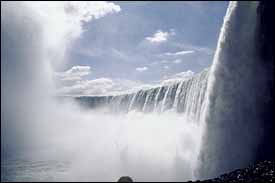
|
Podcast

|
Maturity
Encouragement
Good News
Church
Communion
Prayer
Christian Symbols
Scholarly Articles
Miscellany

|
Easter
Thanksgiving
Pentecost
Stations of the Cross

|
New Testament
Gospels
Acts
Paul's Letters
General Letters
Revelation
Topical Studies

|
Bible Studies
Articles
Books
Podcasts
Search
Menu
Donate
About Us
FAQ
Contact Us
Site Map
|
|
The Holy Spirit is infinitely larger than our categories for him. I have been a careful student of God's word all my life. I've spent hundreds of hours studying what the Bible teaches about the Holy Spirit. But when it comes to integrating Bible terminology and events with present-day spiritual phenomena in our lives and in our churches, I find that our typical Catholic, Protestant, Evangelical and Pentecostal church teachings and terminology about the Holy Spirit are way too rigid to explain adequately the work of the Holy Spirit in Christians today.
Without being dogmatic, I'd like to present three propositions that help me understand better what the Holy Spirit is doing today, and how to relate that to the terminology we find in the Scripture.
- In the Bible the "baptism of the Holy Spirit" (Synoptic Gospels and Acts) is another way of referring to "the New Birth" and the "Indwelling Spirit" (John and Paul), not a separate "experience" itself.
- The spontaneous occurrence of speaking in tongues and prophecy has a logical cause in a sudden "filling" of the Holy Spirit.
- We should seek and expect many "fillings" and spiritual breakthroughs in the Holy Spirit as we seek God with all our hearts. Our experience classification system is inadequate to describe them.
Let's begin with the first statement.
Proposition 1: The "baptism of the Holy Spirit" (Synoptic Gospels and Acts) is another way of referring to "the New Birth" and the "Indwelling Spirit" (John and Paul), not a separate "experience" itself.
|
|
It is well known that terminology in the New Testament varies. The author of one book may prefer different language to describe essentially the same reality.
"Spirit-Filled" versus the Indwelling Spirit
The Bible knows of no Christian life without the Holy Spirit. "If anyone does not have the Spirit of Christ, he does not belong to Christ" (Romans 8:9). It is the indwelling Holy Spirit that regenerates or causes rebirth in us (Titus 3:5). Jesus told Nicodemus that "No one can see the kingdom of God unless he is born again" or "from above" (John 3:3).
Is being born by the Spirit different than being filled with the Spirit or baptized with the Spirit? I don't think so. It is just speaking about the work of the same Holy Spirit from different points of view.
I hear people say that they are a "Spirit-filled Christian." I pray that this is true. But usually what they mean by this Christian jargon is that once they spoke in tongues and experienced a "baptism" of the Holy Spirit. Most of the time they aren't commenting on their current degree of yieldedness to God or to the level of the Spirit's water in their souls. It's important for us to remember that "Spirit-filled Christian" and "Born-again Christian" are essentially Christian jargon, not clearly-separated Bible doctrines. Fullness is a state, while baptism and birth are descriptive events. No one has a corner on any of these words. They shouldn't divide us; rather all Christians should have a taste of each. They are different ways of looking at the same Holy Spirit at work in us as believers.
Speaking in Tongues in the New Testament
As you'll see shortly, I believe that tongues and prophecy are valid and wonderful expressions of the Holy Spirit's presence. But as I examine the conversion experiences discussed in the New Testament, I must conclude that tongues and prophecy attended only a minority of them. Otherwise you'd find these words filling the pages of the New Testament. Instead we find the word "tongue" or "tongues" (with the idea of speaking in tongues) only 27 times in the New Testament, and concentrated in only a few places rather than being spread throughout: Mark, 1 time; Acts 4 times; 1 Corinthians 14, 22 times. Speaking in tongues was no doubt common in the New Testament church, but by no means normative or required.
Can a Person Be a Christian without Being "Baptized in the Spirit"?
Let me rephrase that question to: Can a person be a Christian without having an overwhelming experience of being flooded with the Holy Spirit? The answer is yes. Most certainly. Let me ask another question: Can a Christian have overwhelming experiences in the Holy Spirit that lead him or her deeper into God? Of course. Must these experiences be accompanied by speaking in tongues in order to be valid? I think you'd be hard pressed to find support in the Bible for this. Can speaking in tongues and prophecy be valid expressions of the Holy Spirit's presence in our lives? Oh yes!
Instead of putting down denominations for "coldness" or "excess" or whatever, the proper disciple's response to Jesus' offer of an immersion in His Spirit is to say, "Yes, Lord, flood my soul!" Frankly, all of us -- Baptists, Catholics, Pentecostals, you name it -- are living way below the potential of life in the Spirit that God has provided for us.
Proposition 2. The spontaneous occurrence of speaking in tongues and prophecy has a logical cause in a sudden "filling" of the Holy Spirit
Is speaking in tongues the necessary "evidence" of the Spirit baptism that John the Baptist spoke of?1413 I believe that speaking in tongues (glossolalia) can be an evidence, but is not the evidence. Let me explain.
In the Book of Acts there are several instances where believers spoke in tongues when the Holy Spirit first came upon them: the Day of Pentecost (Acts 2:4), at Cornelius' house (Acts 10:45-46; 11:15-17), and at Ephesus (Acts 19:1-7). There are also several instances where this phenomenon is only hinted at or not mentioned at all: at Samaria (Acts 8:17-18) and Paul's conversion (Acts 8:17).
Some denominations use this series of instances to frame a doctrine: speaking in tongues is the necessary evidence or sign of the baptism of the Holy Spirit. While I've had an experience that these denominations would call "the baptism of the Holy Spirit" -- and thank God for it -- I think that this doctrine is too narrow. Here is why.
A Reaction to the Holy Spirit
What we're seeing in each of the instances in Acts is a human reaction to the Holy Spirit coming upon people. They didn't continue to speak spontaneously in tongues after the first wave of the Spirit hit them. After the initial event, speaking in tongues was just one of many ongoing gifts that the Spirit bestowed (1 Corinthians 12:7-11), and speaking in tongues could be controlled by the speaker (1 Corinthians 14:27-28), just as prophecy could be (1 Corinthians 14:31-32).
The Spirit and the Word
What happened at Pentecost and other ancient and modern occasions when people break out in tongues? Back in the Old Testament we see the Spirit coming upon Moses' elders (Numbers 11:24-29), Saul (1 Samuel 10:6), and Saul's soldiers (1 Samuel 19:20-21), causing them to prophesy. It is remarkably similar to the phenomenon on the Day of Pentecost. The Spirit is poured out powerfully and people's spontaneous reaction is to speak God's words out loud. They can't help it.
This is the same phenomenon described as "the word of God came to John son of Zechariah in the desert" (Luke 3:2) and to other prophets.1414 Typically, the Spirit comes upon the person at the same time the word comes to him or her (for example, Luke 1:41ff; 1:67; Acts 4:31).
What do the Spirit and the word of God have in common? The Spirit provides access to the thoughts and mind of God himself and then enables us to communicate them (1 Corinthians 2:10-16). When the Spirit comes upon a person, so does the ability to hear what God is saying and to speak it out, whether in tongues or in prophecy or in witness (Acts 1:8). Certainly I could demonstrate that in Acts 1-2, the coming of the Holy Spirit produced power to have words to witness (Acts 1:8; 2:37-41) = to speak in tongues (Acts 2:4) = to prophesy (Acts 2:11, 17-18).
Was speaking in tongues on the Day of Pentecost actually prophecy? Yes, I believe so. The hearers exclaim, "We hear them declaring the wonders (Greek plural megaleios) of God in our own tongues!" (Acts 2:11). The Greek word megaleios means, "magnificent, splendid, grand;" in our literature only substantive: "greatness, sublimity ... mighty deeds."1415 We see this kind of prophecy in the Psalms, where the Spirit-filled Psalmist declares:
 "O Lord, our Lord,
"O Lord, our Lord,
how majestic is your name in all the earth!
You have set your glory
above the heavens....
When I consider your heavens,
the work of your fingers,
the moon and the stars,
which you have set in place,
what is man that you are mindful of him,
the son of man that you care for him?" (Psalm 8:1, 3, 4)
Isaiah the prophet, under the anointing of the Spirit, declares:
"See, the Sovereign Lord comes with power,
and his arm rules for him.
See, his reward is with him,
and his recompense accompanies him.
He tends his flock like a shepherd:
He gathers the lambs in his arms
and carries them close to his heart;
he gently leads those that have young.
Who has measured the waters in the hollow of his hand,
or with the breadth of his hand marked off the heavens?
Who has held the dust of the earth in a basket,
or weighed the mountains on the scales
and the hills in a balance?
Who has understood the mind of the Lord,
or instructed him as his counselor?
Whom did the Lord consult to enlighten him,
and who taught him the right way?
Who was it that taught him knowledge
or showed him the path of understanding?
Surely the nations are like a drop in a bucket;
they are regarded as dust on the scales;
he weighs the islands as though they were fine dust." (Isaiah 40:10-15)
These examples could be multiplied a hundred-fold. What we're seeing in these Scriptures is a prophetic speaking out of the "mightinesses" of God, the same kind of content as the speaking in tongues on the Day of Pentecost. I believe that speaking in tongues is a subset of prophecy. They are both a speaking of the word of God, one in the speaker's language, the other in a language unfamiliar to the speaker.
Initial Speaking in Tongues
 A huge amount of energy is released when Niagara Falls suddenly drops 183 feet. |
Why would people speak in tongues or prophesy initially, but not later? My mental model is this -- though I can't prove it from Scripture. The Niagara River that flows from Lake Erie north to Lake Ontario carries a tremendous amount of water flow, and a total drop of 326 feet over 35 miles, making it one of the best sources of hydroelectric power in North America. It represents tremendous energy, but energy under control, as the river flows between the riverbanks. When it flows over Niagara Falls, however, it releases a lot of raw energy. The elevation difference is so great -- 185 feet -- that a tremendous amount of energy is released all at once, in spray and noise.
When a non-Christian or a taking-it-for-granted Christian encounters the power of the Holy Spirit in an immersion or outpouring or overwhelming or filling experience, the results can be uncontrollable, at least initially. The Spirit can overflow our psyche's container. The difference between the former spiritual level and the new level of the Spirit is just too great to occur without some outward manifestation. It's like a power spike that blows out television sets and computers. Usually, after the initial "immersion" experience, a Christian can learn to walk in the power of the Spirit through voluntary submission, rather than involuntary loss of control. The power of life in the flow of the underlying Spirit is immeasurable. I know this waterfall/energy differential analogy is pretty crude and can't be pressed, but it helps me visualize part of what I think is going on.
What am I getting at? Just this: tongues are not the point in Spirit baptism. Spontaneous speaking in tongues is just a symptom or tip-of-the-iceberg glimpse of the much deeper and more pervasive work the Spirit is doing to establish heavy-duty communication channels to the mind of Christ. That the "word" of God should pop out unexpectedly in tongues or prophecy shouldn't surprise us.
Initial Manifestations
Since the days of the Charismatic Movement in the early 1960s, I've been a careful observer of people being baptized with the Spirit. I've heard everything from people being coached to speak in tongues, to spontaneous tongues, to prophecy, to laughter, to joyful tears, to shouted praises, to deep repentance, to anguished weeping, to overwhelming joy, being "slain in the Spirit," to profound silence before God. None of these are "the sign" that we are to seek. We are to seek the Spirit himself. I've also observed that God is no respecter of denominations. A careful reading of Church history makes it abundantly clear to me that numerous men and women ("saints") throughout history have been powerfully used by the Spirit -- and certainly "filled" or "immersed/baptized" -- some with, and many without, the "evidence" of speaking in tongues. The Spirit baptism is not exclusively a first century -- or a twentieth century -- phenomenon. It is a gift to all generations of Christians.
Proposition 3: We should seek and expect many "fillings" and spiritual breakthroughs in the Holy Spirit as we seek God with all our hearts. Our experience classification system is inadequate to describe them.
Does every Christian need one of these "baptism"-type, quantum-leap experiences? God deals with us all differently. Each of us is wired uniquely -- physically, emotionally, spiritually, and in our own personal histories. None of us ever has exactly the same experience as someone else. God gives us what we have faith for -- and sometimes beyond. The level of spiritual life in the heavenly places is so much higher (or deeper -- words fail), that we're not going to get all the way gradually. Part of the way, maybe, but not all the way. Growth will be mostly gradual, but sometimes a wild new ride where we've never been before in God.
Fullness and Fillings
It is my observation that a common pattern in Christians is a powerful initial filling of the Holy Spirit, and then a lifetime of occasional "refillings" -- high points or breakthroughs where the Holy Spirit overwhelms us again. We're like water glasses left for a few days on the table. We evaporate and end up half-full. We need to be filled again. The Holy Spirit who dwells in us is fully-God, fully-powerful, but we are not fully yielded at the moment, and therefore aren't fully full. My words are inadequate here, but perhaps you know what I'm trying to express.
Breakthroughs and Baptisms
I have a suitcase that is normal size most of the time. But when I come back from a trip with new purchases or presents there is an expandable compartment that unzips and allows me an extra two or three inches in suitcase width. In a similar way, we not only need to be refilled, we need our capacity expanded by God. It's my experience as a pilgrim and a pastor that most of the time the expansion and growth is gradual. But there are sometimes events that trigger radical new understandings and sudden growth spurts in faith and love for God. If you transfer these free-fall, power-spike experiences into Biblical terms, you come up with "filled" or "baptized," "astonished" or "amazed," "poured out" or "caught up." Words struggle to express it completely.
Reformed and evangelical churches have brought us an appreciation of the grace of God's salvation, and we are immeasurably richer for this understanding. Pentecostal churches have brought us an appreciation for the supernatural spiritual gifts and a new dimension of praise, and we are immeasurably richer for it. None of us has a corner on the truth. We're all learning. Like blind men touching different parts of an elephant, we can view the elephant as essentially a trunk, a foot, or a tail, and still miss its essence because we can't see the whole elephant. We approach the vastness of God in the same way. We make our own experiences and terminology normative, but fail to see how our view fits with the whole.
Seeking Experiences and Seeking God
I have a pastor friend, now with the Lord, whom I tenderly think of as an "experience junkie." He was constantly seeking a new experience. He traveled to the Brownsville Revival and the Toronto Blessings in search of what God was doing. Then he would come back to his congregation to share what he had discovered and try to help them experience the same things he had. My friend had a wonderful heart for God, but I think too often God's presence was sought by means of one experience or another.
Ultimately, dear friends, we are not to seek experiences, but God himself. Yes, hearing of other's experiences is good, because it prods us to realize that there is yet more of God for us to press into and know. Let's not settle for the status quo of our surface religious experience labels, but seek to know God himself, deeper and deeper, all throughout our lives.
Plumbing the Depths of God
 The Apostle Paul had been converted, filled with the Holy
Spirit, spoken in tongues, and, early in his Christian life, had been "caught up
to the third heaven" (2 Corinthians 12:2-4). But he was never complacent as if
he had arrived. He sought hard after God all his life. His passion was to know
God in the now. Whenever I read this passage, written from the chains of
prison, I am encouraged to continue this great quest:
The Apostle Paul had been converted, filled with the Holy
Spirit, spoken in tongues, and, early in his Christian life, had been "caught up
to the third heaven" (2 Corinthians 12:2-4). But he was never complacent as if
he had arrived. He sought hard after God all his life. His passion was to know
God in the now. Whenever I read this passage, written from the chains of
prison, I am encouraged to continue this great quest:
I want to know Christ and the power of his resurrection and the fellowship of sharing in his sufferings, becoming like him in his death, and so, somehow, to attain to the resurrection from the dead. Not that I have already obtained all this, or have already been made perfect, but I press on to take hold of that for which Christ Jesus took hold of me. Brothers, I do not consider myself yet to have taken hold of it. But one thing I do: Forgetting what is behind and straining toward what is ahead, I press on toward the goal to win the prize for which God has called me heavenward in Christ Jesus. (Philippians 3:10-14)
Dear friends, my prayer for you and me is the prayer that Paul prayed for the Ephesian believers:
"I keep asking that the God of our Lord Jesus Christ, the glorious Father, may give you the Spirit of wisdom and revelation, so that you may know him better. I pray also that the eyes of your heart may be enlightened in order that you may know the hope to which he has called you, the riches of his glorious inheritance in the saints, and his incomparably great power for us who believe. That power is like the working of his mighty strength, which he exerted in Christ when he raised him from the dead and seated him at his right hand in the heavenly realms...." (Ephesians 1:17-20)
Amen. Grant it, Lord Jesus!
[1413] Luke 3:16; Matthew 3:11; Mark 1:8) and Jesus (Acts 1;5,8; 11:15-17
[1414] Jeremiah 1:2; 2:1; Ezekiel 1:3; Hosea 1:1-2; Jonah 1:1; Micah 1:1; Zephaniah 1:1
[1415] Megaleios, Walter Bauer and Frederick W. Danker, A Greek-English Lexicon of the New Testament and Other Early Christian Literature (Third Edition; based on a previous English edition by W.F. Arndt, F.W. Gingrich, and F.W. Danker; University of Chicago Press, 1957, 1979), p. 622
Copyright © 2025, Ralph F. Wilson. <pastor![]() joyfulheart.com> All rights reserved. A single copy of this article is free. Do not put this on a website. See legal, copyright, and reprint information.
joyfulheart.com> All rights reserved. A single copy of this article is free. Do not put this on a website. See legal, copyright, and reprint information.



 To be notified about future articles, stories, and Bible studies, why don't you subscribe to our free newsletter, The Joyful Heart, by placing your e-mail address in the box below. We respect your
To be notified about future articles, stories, and Bible studies, why don't you subscribe to our free newsletter, The Joyful Heart, by placing your e-mail address in the box below. We respect your